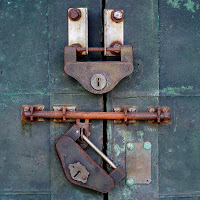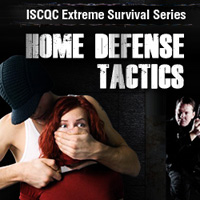 |
| Wikimedia Commons image |
Gaye Levy, Contributing Writer
Activist Post
A major component of family preparedness is the maintenance of comfort, control and self-preservation in a time of crisis. Whatever the source of the crisis, we as humans want to protect the homestead and our loved ones at any cost. (And by the way, many species in the animal kingdom do the same.)
The reason I bring this topic to the forefront is that yesterday, at a community meeting, I learned that home burglaries are on the rise. This – in a community where many still do not lock their doors – was no surprise to me given the dire straits so many are in financially. Still, it was a wake-up call reminding me that I need to do an inventory of the home security and crime prevention measures currently in place so that I can ensure that both myself and my preps are secure.
Here are a dozen countermeasures we can take to secure our homes and families from crime:
1. Secure your doors with multiple locking mechanisms. Yes, it is an annoyance to carry multiple keys but why make it easy for the bad guys? A dead-bolt is essential and even two would not be excessive. Make sure the locks are difficult to pick and please remember that a lock is only as good as the strength of the door frame.
2. Do not leave keys under mats, under flower pots, on top or doorframes or in one of those $3 magnetic key carriers that fit under the frame of your car. Thieves know about these places and are more clever than you might think when it comes to locating a spare. Here at my place we have secured a spare key in a coded key vault , similar to the type real estate agents use. (And dare I say that I have lost my keys more than once on the trails and that having a spare has saved the day?)
3. Do not put your name and address on your key ring. If you lose your keys – and who hasn’t – why advertise your home location and provide easy entrance. You might as well put a sign on your front door that says “TAKE ME”.
4. Keep your outdoor areas well lit. This does not have to be costly. Even shaded areas will benefit from inexpensive solar lighting. Put porch lights on a dawn to dusk timer and make sure your garage entrance is not shrouded in darkness.
5. Consider an alarm system. I am not talking about an expensive monitored alarm system and, as a matter of fact, I think advertising that you have a monitored system (whether or true or not) simply tells the world that you have lots of goodies that need protection. When I say alarm system, I am referring to a loud horn or blast that goes off when someone invades your territory. This is especially effective if you have neighbors who will also hear the alarm but even in a more remote area, the alarm will annoy and dissuade the burglars from sticking around.
6. Add internal locks to critical storage areas. This includes your emergency food storage area, crawl spaces, and your freezer. I almost forgot about the freezer myself since they are the garage. And yet the garage can be one of the most vulnerable areas of your home since it is typically dark and remote sound-wise from the rest of the house.
7. Secure your mail. In addition to minimizing identity theft, an over flowing mail box is an open invitation to thieves who will assume you are not at home or traveling. Invest in a PO box – they are cheap.
8. Keep your outdoor areas tidy. Trim shrubs that are close to the house so that strangers can not skulk or hide behind them, waiting and watching for the best time to attack. Have someone mow the grass when you will be gone for a week or longer and if you still have the newspaper delivered, for goodness sake, stop delivery while you are gone.
 |
| Ad |
9. Notify the police or sheriff that you are going to be gone. This may not work in all situations but here in my rural community, we are encouraged to let the authorities know when we are going to be off island for an extended period.
10. Be wary of strangers, delivery people, and yes, even officers of the law that come to your door. Have your pepper spray handy and ask for ID. If in doubt, do not open the door. Ask for a badge or ID number and call it in. Remember, uniforms can be readily purchased online and in these days of Photoshop, fake ID can be easily created on a home computer.
11. Know your neighbors. I have said this before and will say it again: neighbors and community members that know you by name and by face will be the ones that will watch your back in a crisis. You do not have to become best friends with these people – but you do need to say hi once in awhile and perhaps get involved in some community activities so that they can get to know you and you them.
12. Get a dog. A dog is a great – really great – early warning system. Heck, my little six pound Yorkie makes a lot of racket if a stranger is walking around outside at night. He might not scare an intruder once he is in the house, but he certainly would give the would-be burglar reason to look elsewhere.
As a bonus, I need to add one more thing:
Zip those lips. This is my weakness and something I will commit to stopping RIGHT NOW! In my effort to spread the word about family preparedness, I talk about my own efforts – what I have, how I am storing it, and worst of all, where I have located my stuff. Shame on me. What I have effectively done is advertise the fact that if the SHTF, you can come to my place because I have food, I have water, I have stuff. This is going to be difficult because I do want to educate and help others. But I am going to really try to be a bit more private on a going forward basis.
Think Like a Burglar
In closing, I want to pass on that the very best advice I can give is to learn to think like a burglar. Walk around your place, and, pretending you are a bad guy, think about points of entry. Take a look at you home from the street. Are you advertising all of the goodies inside? Or does your home look like a modest, well kept abode with good lighting and well trimmed landscaping? If you were a burglar, which home on your street would you hit?
As you know, a crisis can come from a natural disaster, a medical pandemic, and economic collapse, or a man-made activity such as a terrorist attack. By practicing crime prevention now – and making home security a part of daily life – you can be one step closer to preserving the homestead when the SHTF.
Enjoy your next adventure through common sense and thoughtful preparation! — Gaye
Gaye Levy, the SurvivalWoman, grew up and attended school in the Greater Seattle area. After spending many years as an executive in the software industry, she started a specialized accounting practice offering contract CFO work to emerging high tech and service industries. She has now abandoned city life and moved to a serenely beautiful rural area on an island in NW Washington State. She lives and teaches the principles of a sustainable, self-reliant and stylish lifestyle through emergency preparation and disaster planning through her website at BackdoorSurvival.com. SurvivalWoman speaks her mind and delivers her message with optimism and grace, regardless of mayhem swirling around us.
linkwithin_text=’Related Articles:’


Be the first to comment on "12 Home Security and Crime Prevention Tips for the Prepper"